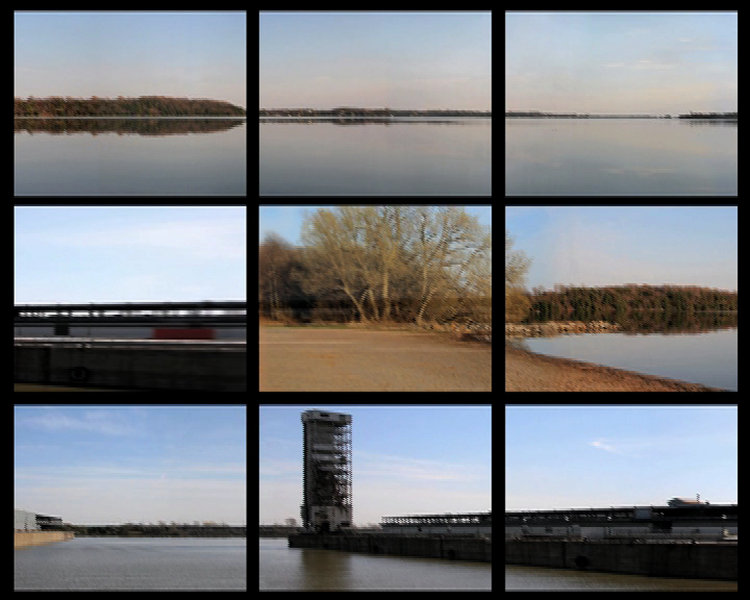
THE WORLD IS TOO MUCH WITH US
06,00 m, 2009
The world is too much with us; late and soon,
Getting and spending, we lay waste our powers;
Little we see in Nature that is ours;
We have given our hearts away, a sordid boon!
William Wordsworth (1807)
This post-Romantic video focuses on the conspicuous clash and the likely match between the world of man and the world of nature.
The mosaic of moving images leaves the beholder with an ambivalent sense of discontinuity and flow. Each image is confined to its own frame and yet the frames gradually reveal themselves as the fragments of a series of pictures.
As the frames tail off to the top left end of the screen and are succeeded by new frames streaming into the bottom right corner, we realize that the human presence in these landscapes is slowly but steadily growing: the clear horizon, the green fields and the blue sea of the opening frames give way to a skyline of high-rise buildings and skyscrapers, which are in turn replaced by the recesses of industrial backyards. The movement from right to left suggests regress rather than progress.
At the same time, the repetition of some déjà vu images, as well as the re-emergence of natural landscapes amongst the urban frames, makes one think that the process is not necessarily irreversible and that a marriage between man and nature is still possible.
The musical score, which features a blend between the variations of natural chirps and the repetitiveness of an electronic beat, contributes to conveying the same message.
Lubomir Terziev
The world is too much with us; late and soon,
Getting and spending, we lay waste our powers;
Little we see in Nature that is ours;
We have given our hearts away, a sordid boon!
William Wordsworth (1807)
This post-Romantic video focuses on the conspicuous clash and the likely match between the world of man and the world of nature.
The mosaic of moving images leaves the beholder with an ambivalent sense of discontinuity and flow. Each image is confined to its own frame and yet the frames gradually reveal themselves as the fragments of a series of pictures.
As the frames tail off to the top left end of the screen and are succeeded by new frames streaming into the bottom right corner, we realize that the human presence in these landscapes is slowly but steadily growing: the clear horizon, the green fields and the blue sea of the opening frames give way to a skyline of high-rise buildings and skyscrapers, which are in turn replaced by the recesses of industrial backyards. The movement from right to left suggests regress rather than progress.
At the same time, the repetition of some déjà vu images, as well as the re-emergence of natural landscapes amongst the urban frames, makes one think that the process is not necessarily irreversible and that a marriage between man and nature is still possible.
The musical score, which features a blend between the variations of natural chirps and the repetitiveness of an electronic beat, contributes to conveying the same message.
Lubomir Terziev
PIXEL GAME
2009-10-30 21:00 - 21:30
Pixel-Game is a live VJ performance in real time capture.We are playing with one TV, a MIDI controller, a digital camera and ATARI computer console on real time capture to VJ software.Two dimensions between digital and real, progress or regress, look to the past and futur... more



